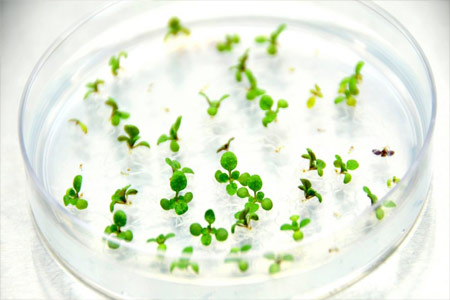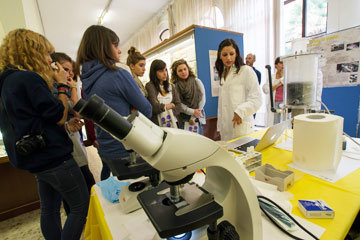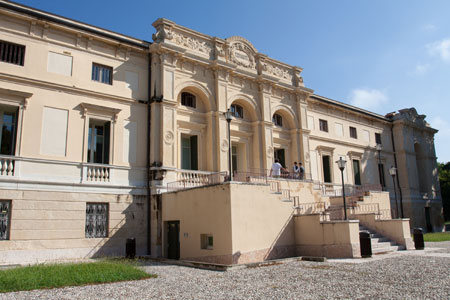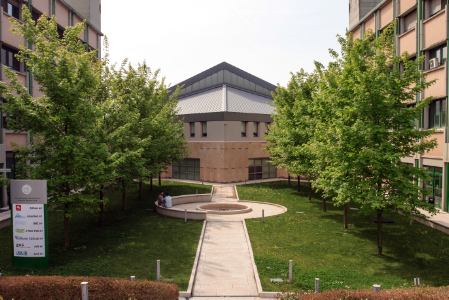|
Bachelor's degree in Biotechnology
Course partially running
|
Methods in Molecular Biology and Genetics (2025/2026)
|
12
|

|
1
|
(teoria)
|
|
1
|
[2° turno] (laboratorio)
|
|
1
|
[1° turno] (laboratorio)
|
|
Master's degree in Agri-Food Biotechnology
|
Molecular Genetics and Genomic Tools for Plant Breeding (2025/2026)
|
6
|

|
3
|
(Miglioramento genetico teoria)
|
|
Master's degree in Agri-Food Biotechnology
|
Omics sciences (2025/2026)
|
12
|

|
2
|
MODULO I (Trascrittomica laboratorio)
|
|
2
|
MODULO I (Trascrittomica teoria)
|
|
Master's degree in Viticulture, Oenology and the Wine Market (interuniversity)
Course partially running
|
Analysis of viticultural terroirs (2025/2026)
|
10
|

|
3
|
VARIETAL AND GENETIC IDENTITY OF GRAPEVINE
|
|
Bachelor's degree in Biotechnology
Course partially running
|
Methods in Molecular Biology and Genetics (2024/2025)
|
12
|

|
1
|
[2° turno] (laboratorio)
|
|
1
|
(teoria)
|
|
1
|
[1° turno] (laboratorio)
|
|
Master's degree in Agri-Food Biotechnology
Course partially running
|
Molecular Genetics and Genomic Tools for Plant Breeding (2024/2025)
|
6
|

|
3
|
(Miglioramento genetico teoria)
|
|
Master's degree in Agri-Food Biotechnology
Course partially running
|
Omics sciences (2024/2025)
|
12
|

|
2
|
MODULO I (Trascrittomica laboratorio)
|
|
2
|
MODULO I (Trascrittomica teoria)
|
|
Master's degree in Viticulture, Oenology and the Wine Market (interuniversity)
Course partially running
|
Analysis of viticultural terroirs (2024/2025)
|
10
|

|
3
|
VARIETAL AND GENETIC IDENTITY OF GRAPEVINE
|
|
Bachelor's degree in Biotechnology
Course partially running
|
Methods in Molecular Biology and Genetics (2023/2024)
|
12
|

|
1
|
[1° turno] (laboratorio)
|
|
2
|
(teoria)
|
|
1
|
[2° turno] (laboratorio)
|
|
Master's degree in Agri-Food Biotechnology
Course partially running
|
Molecular Genetics and Genomic Tools for Plant Breeding (2023/2024)
|
6
|

|
3
|
(Miglioramento genetico teoria)
|
|
Master's degree in Agri-Food Biotechnology
Course partially running
|
Omics sciences (2023/2024)
|
12
|

|
2
|
MODULO I (Trascrittomica teoria)
|
|
2
|
MODULO I (Trascrittomica laboratorio)
|
|
Master's degree in Viticulture, Oenology and the Wine Market (interuniversity)
Course partially running
|
Analysis of viticultural terroirs (2023/2024)
|
10
|

|
3
|
VARIETAL AND GENETIC IDENTITY OF GRAPEVINE
|
|
Bachelor's degree in Biotechnology
Course partially running
|
Methods in Molecular Biology and Genetics (2022/2023)
|
12
|

|
1
|
[1° turno] (laboratorio)
|
|
2
|
(teoria)
|
|
1
|
[2° turno] (laboratorio)
|
|
Master's degree in Agri-Food Biotechnology
Course partially running
|
Molecular Genetics and Genomic Tools for Plant Breeding (2022/2023)
|
6
|

|
3
|
(Miglioramento genetico teoria)
|
|
Master's degree in Agri-Food Biotechnology
Course partially running
|
Omics sciences (2022/2023)
|
12
|

|
2
|
MODULO I (Trascrittomica teoria)
|
|
2
|
MODULO I (Trascrittomica laboratorio)
|
|
Master's degree in Viticulture, Oenology and the Wine Market (interuniversity)
Course partially running
|
Analysis of viticultural terroirs (2022/2023)
|
10
|

|
3
|
VARIETAL AND GENETIC IDENTITY OF GRAPEVINE
|
|
Bachelor's degree in Biotechnology
Course partially running
|
Methods in Molecular Biology and Genetics (2021/2022)
|
12
|

|
1
|
[2° turno] (laboratorio)
|
|
2
|
(teoria)
|
|
1
|
[1° turno] (laboratorio)
|
|
Master's degree in Agri-Food Biotechnology
Course partially running
|
Molecular Genetics and Genomic Tools for Plant Breeding (2021/2022)
|
6
|

|
3
|
(Miglioramento genetico teoria)
|
|
Master's degree in Agri-Food Biotechnology
Course partially running
|
Omics sciences (2021/2022)
|
12
|

|
2
|
MODULO I (Trascrittomica teoria)
|
|
2
|
MODULO I (Trascrittomica laboratorio)
|
|
Master's degree in Viticulture, Oenology and the Wine Market (interuniversity)
Course partially running
|
Analysis of viticultural terroirs (2021/2022)
|
10
|

|
3
|
VARIETAL AND GENETIC IDENTITY OF GRAPEVINE
|
|
Bachelor's degree in Biotechnology
Course partially running
|
Methods in Molecular Biology and Genetics (2020/2021)
|
12
|

|
2
|
[1° turno] (laboratorio)
|
|
2
|
(teoria)
|
|
2
|
[2° turno] (laboratorio)
|
|
Master's degree in Agri-Food Biotechnology
Course partially running
|
Molecular Genetics and Genomic Tools for Plant Breeding (2020/2021)
|
6
|

|
3
|
(Miglioramento genetico teoria)
|
|
Master's degree in Agri-Food Biotechnology
Course partially running
|
Omics sciences (2020/2021)
|
12
|

|
2
|
MODULO I (Trascrittomica teoria)
|
|
2
|
MODULO I (Trascrittomica laboratorio)
|
|
Bachelor's degree in Biotechnology
Course partially running
|
Methods in Microbiology and Genetics (2019/2020)
|
12
|

|
2
|
[2° turno] (laboratorio Metodologie di genetica)
|
|
2
|
[1° turno] (laboratorio Metodologie di genetica)
|
|
2
|
(teoria Metodologie di genetica)
|
|
Master's degree in Agri-Food Biotechnology
Course partially running
|
Molecular Genetics and Genomic Tools for Plant Breeding (2019/2020)
|
6
|

|
3
|
(miglioramento genetico teoria)
|
|
Master's degree in Agri-Food Biotechnology
Course partially running
|
Omics sciences (2019/2020)
|
12
|

|
2
|
MODULO I (Trascrittomica teoria)
|
|
2
|
MODULO I (Trascrittomica laboratorio)
|
|
Bachelor's degree in Biotechnology
Course partially running
|
Methods in Microbiology and Genetics (2018/2019)
|
12
|

|
3
|
(laboratorio Metodologie di Genetica)
|
|
2
|
(teoria Metodologie di Genetica)
|
|
Master's degree in Agri-Food Biotechnology
Course partially running
|
Omics sciences (2018/2019)
|
12
|

|
3
|
MODULO I (Trascrittomica laboratorio)
|
|
1
|
MODULO I (Trascrittomica teoria)
|
|
Bachelor's degree in Biotechnology
Course partially running
|
Methods in Microbiology and Genetics (2017/2018)
|
12
|

|
3
|
(laboratorio Metodologie di Genetica)
|
|
2
|
(teoria Metodologie di Genetica)
|
|
Master's degree in Agri-Food Biotechnology
Course partially running
|
Omics sciences (2017/2018)
|
12
|

|
3
|
MODULO I (Trascrittomica laboratorio)
|
|
1
|
MODULO I (Trascrittomica teoria)
|
|
Bachelor's degree in Biotechnology
Course partially running
|
Methods in Microbiology and Genetics (2016/2017)
|
12
|

|
3
|
(laboratorio Metodologie di Genetica)
|
|
2
|
(teoria Metodologie di Genetica)
|
|
Master's degree in Agri-Food Biotechnology
Course partially running
|
Omics sciences (2016/2017)
|
12
|

|
3
|
MODULO I (Trascrittomica laboratorio)
|
|
1
|
MODULO I (Trascrittomica teoria)
|
|
Bachelor's degree in Biotechnology
Course partially running
|
Methods in Microbiology and Genetics (2015/2016)
|
12
|
|
2
|
(teoria Metodologie di Genetica)
|
|
3
|
[Turno2] (laboratorio Metodologie di Genetica (Bellin))
|
|
3
|
[Turno1] (laboratorio Metodologie di Genetica (Bellin))
|
|
Master's degree in Agri-Food Biotechnology
Course partially running
|
Omics sciences (2015/2016)
|
12
|
|
1
|
MODULO I (Trascrittomica teoria)
|
|
3
|
MODULO I (Trascrittomica laboratorio)
|
|
Master's degree in Agri-Food Biotechnology
Course partially running
|
Molecular analytical methods
(2014/2015)
|
12
|
|
1
|
TRASCRITTOMICA (teoria)
|
|
3
|
TRASCRITTOMICA (laboratorio)
|
|
Bachelor's degree in Viticultural and Oenological Science and Technology
Course partially running
|
Plant genetics and breeding (2014/2015)
|
6
|
|
1
|
[laboratorio II] (laboratorio)
|
|
1
|
[laboratorio I] (laboratorio)
|
|
Master's degree in Agri-Food Biotechnology
Course partially running
|
Molecular analytical methods
(2013/2014)
|
12
|
|
3
|
TRASCRITTOMICA (laboratorio)
|
|
1
|
TRASCRITTOMICA (teoria)
|
|
Master's degree in Agri-Food Biotechnology
Course partially running
|
Molecular analytical methods
(2012/2013)
|
12
|
|
3
|
TRASCRITTOMICA (Laboratorio)
|
|
1
|
TRASCRITTOMICA (Teoria)
|
|
Master's degree in Agri-Food Biotechnology
Course partially running
|
Molecular analytical methods
(2011/2012)
|
12
|
|
1
|
TRASCRITTOMICA (Teoria)
|
|
3
|
TRASCRITTOMICA (Laboratorio)
|
|
Bachelor in Agroindustrial Biotechnology (until 2008-2009 academic year)
Course Not running, not visible
|
Biomolecular Technology (2009/2010)
|
8
|
|
2
|
(Laboratorio)
|
|
Master's degree in Agri-Food Biotechnology
Course partially running
|
Molecular analytical methods
(2009/2010)
|
9
|
|
1
|
GENOMICA E TRASCRITTOMICA (Teoria)
|
|
2
|
GENOMICA E TRASCRITTOMICA (Laboratorio)
|








 bellin
bellin univr
univr
